Trudeau Introduces Bill To Legalize Marijuana In Canada
Fulfilling a promise.
Fulfilling a promise made during 2015’s General Election, Canadian Prime Minister Justin Trudeau has introduced a bill in Parliament that would legalize recreational marijuana throughout all of Canada:
OTTAWA — Fulfilling a campaign pledge, Prime Minister Justin Trudeau introduced legislation on Thursday to legalize the recreational use of marijuana in Canada.
Many nations have either decriminalized marijuana, allowed it to be prescribed medically or effectively stopped enforcing laws against it. But when Mr. Trudeau’s bill passes as expected, Canada will become only the second nation, after Uruguay, to completely legalize marijuana as a consumer product.
“Criminal prohibition has failed to protect our kids and our communities,” said Bill Blair, a lawmaker and former Toronto police chief whom Mr. Trudeau appointed to manage the legislation.
Mr. Blair said at a news conference that the government hoped to begin allowing legal sales by the middle of 2018. While the government’s plan has been broadly shaped by a panel of experts, many issues still need to be ironed out.
“We do accept that important work remains to be done,” he said.
While the federal government will license and regulate growers, each of Canada’s provinces will need to decide exactly how the drug will be distributed and sold within its boundaries. The government will have to develop the marijuana equivalents of breathalyzers so that drivers can be checked for impairment at the roadside and workers can be tested for safety on the job. Diplomats will have to address conflicts with international drug treaties. And many in the medical field are concerned about the long-term health effects of increased use of marijuana by Canadians under the age of 25.
Though eight American states have legalized marijuana to various extents, the drug remains illegal under federal law. Mr. Trudeau’s move eliminates any such ambiguity in Canada. It follows a court-mandated legalization of marijuana for medical purposes, which was introduced with tight controls in 1999 and later broadened by further court orders.
While the new legislation will take Canada beyond its medical marijuana system, it stops far short of creating an open market. The law will require purchasers to be at least 18 years old — though provinces can set a higher minimum — and it will limit the amount they can carry at any one time to 30 grams, about an ounce.
Households will be allowed to grow up to four marijuana plants. But the legislation seems built on the assumption that most users will be supplied by commercial growers, who will be licensed and closely supervised by the federal government.
Growing, importing, exporting or selling marijuana outside licensed channels will remain serious crimes, according to Mr. Blair and Ralph Goodale, the public safety minister.
Each province will decide where and how marijuana may be sold, and will set prices in conjunction with the federal government.
How much marijuana will cost and how heavily it will be taxed will be influenced by Canada’s experience with tobacco, which is also tightly regulated.
When the country tried to discourage smoking by sharply increasing cigarette taxes, it inadvertently created a growing black market for cigarettes smuggled from the United States and elsewhere.
Since one of the government’s main aims with the new law is to wipe out — or at least reduce — illicit marijuana dealing, it will want to avoid measures that spur its growth.
It is unclear where users will be able to buy the drug. Several provinces restrict alcohol sales mainly to government-run liquor stores, and a similar arrangement may be used for marijuana. But a federal task force that released its findings late last year recommended that marijuana not be offered in shops that also sell alcohol.
As I said above, this move fulfills a promise that Trudeau’s party made during the 2015 General Election and which became apparent last month when the government announced that a legalization bill would be introduced in April with the goal of complete legalization coming in 2018. Given the fact that Trudeau’s party has the majority in Parliament, it’s essentially guaranteed that the new law will pass into law relatively easily. The main question will be how heavily regulated the sale and marketing of marijuana will be, but it appears that this is a matter that the proposed legislation will likely leave to the discretion of the individual provinces and territories, much like Federal law here in the United States leaves much about the marketing and sale of alcohol and cigarettes to the individual states. Ideally, this is how it should be in the United States. The Federal Government should not be taking any role in deciding the legal status of marijuana, or how it is sold and distributed where it is legal.
As I noted back in March, the significance of this move by Canada should not be underestimated. Recreational marijuana is already legal in eight states, the District of Columbia, and on a number of Native American Reservations, and polls indicate that the majority of Americans approve of legalization, with only Republicans and voters over 65 among the major demographic group where there is still any significant opposition to the idea. At that rate, it’s likely that legalization in the United States will take much the same path that legalization of same-sex marriage did, with some state leading the way while the others take longer. The only difference is that there isn’t really a basis for challenging laws against recreational marijuana in Court, so the process is likely to take more time than legalization of same-sex marriage did. Of course, the process could be sped up significantly with a few minor steps by the Federal Government. As I’ve noted before, marijuana is currently listed as a Schedule I drug by the Drug Enforcement Administration, meaning that it is considered as dangerous as “hard” drugs such as cocaine and heroin. Medical professionals, though, tend to agree that this designation is rather absurd and not supported by any real evidence regarding the effects and dangers of marijuana itself. If that designation were to change, it would likely spur more states to act to legalize at a far more rapid pace. Unfortunately, it doesn’t seem likely that this would happen under the current Administration, so we’ll have to rely on action at the state level to repeal laws that never should have been passed in the first place.
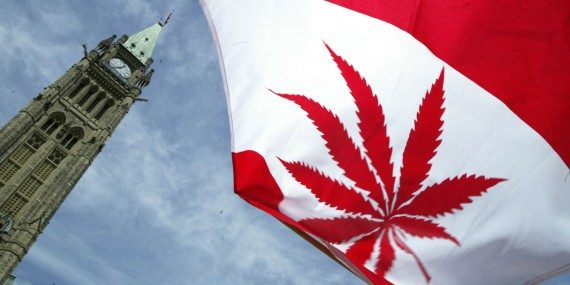

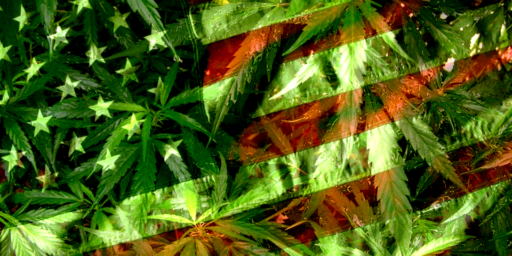
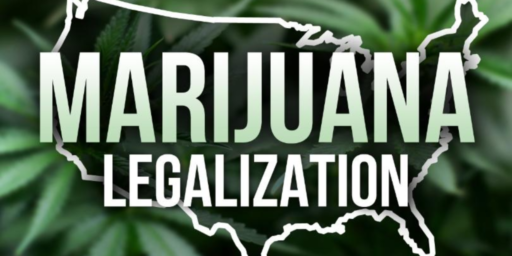
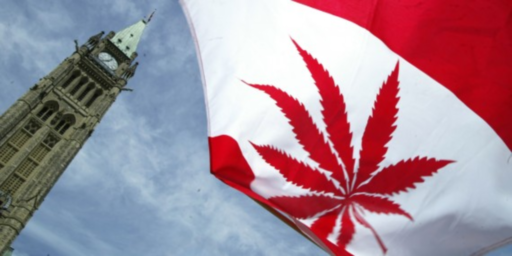
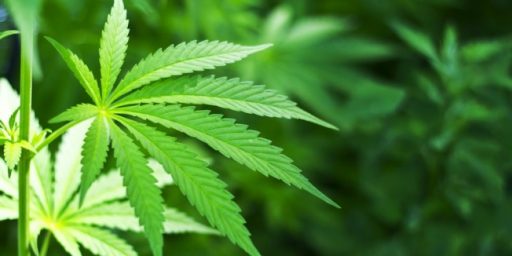
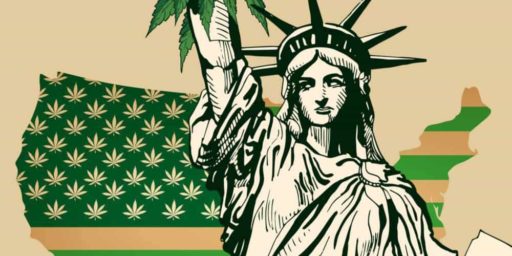
A bill has been introduced to reschedule cannabis as a Schedule III drug. We will, as you say, probably need to wait until Trump has fully looted the country and retires to his favorite golf course before any action is taken on that.
If Sessions cracks down on legal weed in the US Trump’s going to need a second wall on the Canadian border.
@michael reynolds:
You mean Canada is going to need a wall at its southern border. And they’ll make us pay for it. 🙂
Here in Shelton WA i asked a woman who runs one of the local shops if she was worried about Sessions. She said, “Nope. Everybody in the business knows everybody else in the business now. If they shut us down tomorrow it wouldn’t affect a single transaction, they’d just be underground.”
@michael reynolds: Darn you! I had some idea for a remark about the size of Canadian’s calves. Keeping records at the border of calf circumference and comparing results on northern & southern borders, following changes in the size along the Canada side. And you got to it first.
As a somewhat serious aside – long ago I did a research paper on cannabis. VERY long ago. At that time there was a United Nations Convention that banned member states from completely decriminalizing the weed. Has that disappeared in the past 50yrs of so? Is there an office in NYC where international civil servants keep some sort of death watch over the world’s cannabis prohibition?
@JohnMcC:
Does it matter? What’s the UN going to do about it? Send an angry letter to Ottawa?
… eh, don’t bogart that joint, hoser.
Ya wasteyute, take off eh?
@JohnMcC: What kind of calves ? Some kinds are bigger than others – Herefords, Holsteins, and such.
I would support overall legalization in the US under similar strict controls and distribution. Of course allowing counties and towns to decide if they want to allow sales and growing, basically the same as the alcohol laws.
The medical profession seems divided in their opinions on the medicinal benefits and harm.
More studies need to be done.
I remember well the health classes in high school taught that this was another addictive, mind altering drug that would harm vital organs (lungs, heart, brain, liver, kidneys, testicles, and teeth). They showed images of zombie looking people who had used it.
As always I can’t help but wonder just what is it that you are smoking?
(PS-Ty if you hear of any studies that need volunteers let me know.)
@Tyrell: Ha! You got me. If that darn Michael R had let me go first I would have had a much more brilliant little paragraph with references to Congressman Steve King’s famous remark about ‘illegals with calves the size of cantalopes’ from hauling ’75 lbs’ of Pot across the U.S. Mexican border. I suppose I’d have made some remark about the muscle-building journey from the RioGrande to Colorado (Rep King’s perch) while carrying an amazing backpack. (Hint: Has anyone ever tried to pack 75lbs of cannabis into a backpack? Sucker would be so big you’d have to get down on your knees to wear it indoors. That’s indoors in a stadium, practically.)
So to take the joke one more step, why not BISON calves. Good all-American, native-born-and-bred bovines.
You might be performance art, my friend, but two can play, can’t they?
@JohnMcC: Wait did King seriously say 75lbs of pot was being carried by one person??
He’s such a freaking idiot…
To me, this represents real freedom — the freedom of a citizen to choose what to do with his or her own body. But for some reason, the party that screams loudest about “freedom” will fight to their graves before they let legalization happen here. For Republicans, freedom only means that rich people pay low taxes, that they are able to punish unbelievers for not following their own religious beliefs, and and poor and minority people are locked behind bars.
@Matt: “For every (Dreamer who’s a) valedictorian there’s a hundred out there who weigh a hundred and thirty pounds and they’ve got calves the size of cantalopes because they’re hauling seventy five pounds of marijuana across the desert.”
That’s more marijuana than most Appalachian trail hikers carry!
@Mr. Bluster: mushrooms, rabbit tobacco (south east delicacy)
The pretty boy from up north does have some detractors…
@An Interested Party: Consumption of gasoline is in decline. In ten years probably 80% of cars in the US will be electric, hydrogen, or something else. That leaves 18 wheelers, construction equipment, and aircraft using petroleum products. Some businesses around here have switched fork lifts to hydrogen and small trenchers to natural gas. Look at the Boeing 777x. It will use a lot less fuel and will be a model for future airliners. They have also successfully lab tested an ion engine.
So I just can’t see an increase at all in carbon or CO2. It should start dropping.